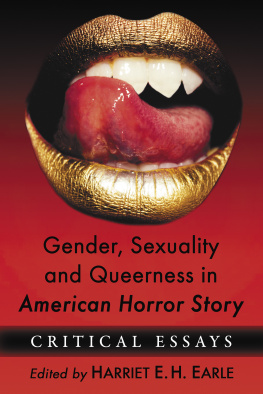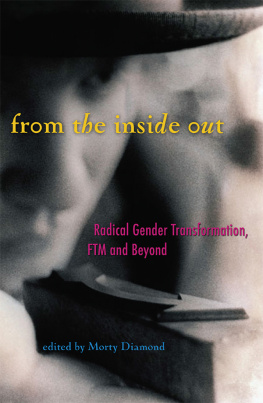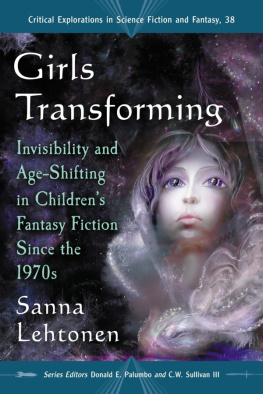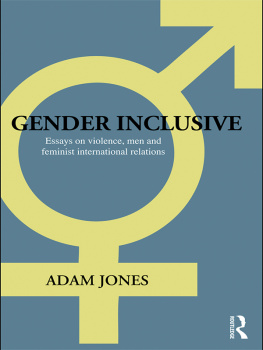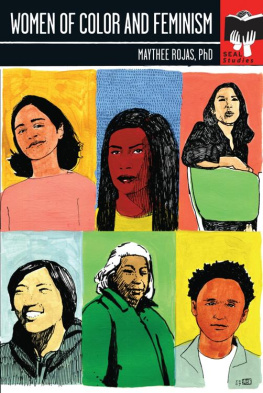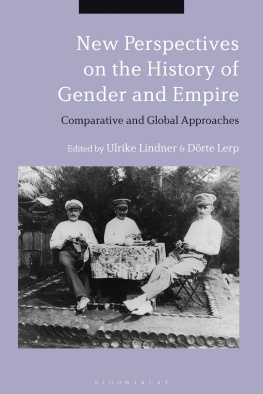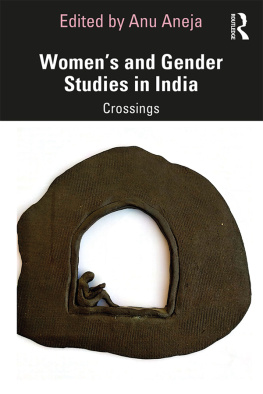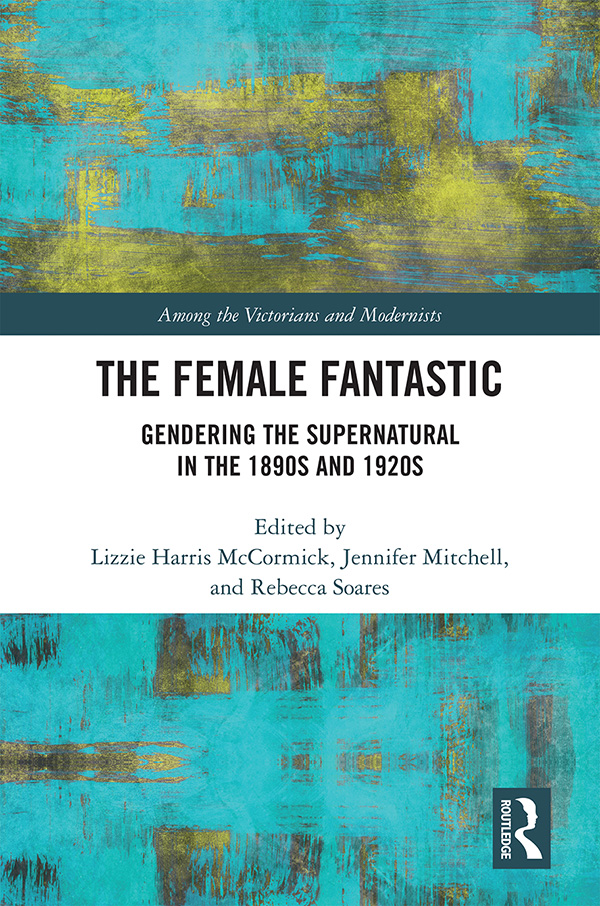Contents
The Female Fantastic
Gendering the Supernatural in the 1890s and 1920s
Edited by
Lizzie Harris McCormick,
Jennifer Mitchell, and Rebecca Soares

First published 2019
by Routledge
711 Third Avenue, New York, NY 10017
and by Routledge
2 Park Square, Milton Park, Abingdon, Oxon OX14 4RN
Routledge is an imprint of the Taylor & Francis Group, an informa business
2019 Taylor & Francis
The right of the editors to be identified as the authors of the editorial material, and of the authors for their individual chapters, has been asserted in accordance with sections 77 and 78 of the Copyright, Designs and Patents Act 1988.
All rights reserved. No part of this book may be reprinted or reproduced or utilised in any form or by any electronic, mechanical, or other means, now known or hereafter invented, including photocopying and recording, or in any information storage or retrieval system, without permission in writing from the publishers.
Trademark notice: Product or corporate names may be trademarks or registered trademarks, and are used only for identification and explanation without intent to infringe.
Library of Congress Cataloging-in-Publication Data
CIP data has been applied for.
ISBN: 978-0-8153-6402-3 (hbk)
ISBN: 978-1-351-10779-2 (ebk)
Typeset in Sabon
by codeMantra
The Female Fantastic
The sudden storm of women writers fantastic literature in the 1890s responded to a wellspring of social and scientific progressivism. The genre became a hotbed for the most radical and problematic debates of the time. New Women authors seized the opportunity to use narratively polymorphous supernatural subgenres to dramatize their particularly activist arguments and ideas. Though this strain of literary feminist energy shifts focus during the Edwardian period, we argue that, due to literary and cultural confluences, it resurges again in the 1920s, as post-suffrage women wrote fantastic texts reinvigorated by modernist forms and modern life.
For women-identified writers of both eras, the fantastic offered double vision. Not only did the genre offer strategic cover for challenging the status quo, but it also offered a heuristic mechanism for teasing out the gendered psyches links to creative, personal, and erotic agency. These dynamic presentations of female and gender-queer subjectivity are linked in intriguing and complex matrices to key moments in gender(ed) history.
This volume contains essays from international scholars covering a wide range of topics, including werewolves, mummies, fairies, demons, time travel, ghosts, haunted spaces and objects, race, gender, queerness, monstrosity, madness, incest, empire, medicine, and science. By interrogating two nonconsecutive decades, we seek to uncover the interrelationships among fantastic literature, feminism, and modern identity and culture. Indeed, while this book considers the relationship between the 1890s and 1920s, it is more an examination of womens modernism in light of gendered literary production during the fin de sicle than the reverse.
Lizzie Harris McCormick holds a PhD in English Literature from The Graduate Center, City University of New York. She is an Associate Professor of English at Suffolk County Community College/State University of New York. She explores womens fantastic literary narratives of artistic creation during the late nineteenth century, especially where they challenged turn-of-the-century British psychological theories of creative imagination and gender. Her scholarship appears in Latchkey, Henry James e-Journal, Nineteenth Century Gender Studies, and The Fantastic of the Fin de Sicle.
Jennifer Mitchell earned her PhD in English Literature from The Graduate Center, City University of New York. Currently an Assistant Professor of English at Union College in Schenectady, New York, she is working on a manuscript about the critical intersection between sexology, modernism, and masochism. Her scholarship has appeared in The Journal of Bisexuality, Bookbird, The Journal of the Fantastic in the Arts, The Virginia Woolf Miscellany, and various edited collections, and she has an article forthcoming in The D.H. Lawrence Review.
Rebecca Soares earned her PhD in Literary Studies from the University of Wisconsin-Madison. She is currently an Honors Faculty Fellow at Barrett, The Honors College at Arizona State University. She is working on a manuscript that examines the nineteenth-century popular practice of spiritualism, transatlantic literature and communication, and print culture. Her work has appeared in Victorian Poetry and Victorian Periodical Review and is forthcoming in Womens Writing.
Contents
NICHOLAS DALY
REBECCA SOARES, LIZZIE HARRIS MCCORMICK AND JENNIFER MITCHELL
SECTION I
Heaps, Rubbish, Treasure, Litter, Tatters: Fantastic Objects in Context
JILL GALVAN
ANNE DELONG
DONNA MITCHELL
JULIA PANKO
MELISSA EDMUNDSON
SECTION II
Profoundly and Irresolvably Political: Fantastic Spaces
LUKE THURSTON
ANNE JAMISON
CLINE MAGOT
JEAN MILLS
SECTION III
The Fantastic and the Modern Female Experience: Fantastic People
SCOTT ROGERS
MARY CLAI JONES
ANDREW HOCK SOON NG
JENNIFER MITCHELL
ELIZABETH ENGLISH
SECTION IV
Invitation to Dissidence: Fantastic Creatures
JESSICA DECOUX
COLLEEN MORRISSEY
LIZZIE HARRIS MCCORMICK
KATE SCHNUR
Among the Victorians and Modernists
Edited by Dennis Denisoff
This series publishes monographs and essay collections on literature, art, and culture in the context of the diverse aesthetic, political, social, technological, and scientific innovations that arose among the Victorians and modernists. Viable topics include, but are not limited to, artistic and cultural debates and movements; influential figures and communities; and agitations and developments regarding subjects such as animals, commodification, decadence, degeneracy, democracy, desire, ecology, gender, nationalism, the paranormal, performance, public art, sex, socialism, spiritualities, transnationalism, and the urban. Studies that address continuities between the Victorians and modernists are welcome. Work on recent responses to the periods such as Neo-Victorian novels, graphic novels, and film will also be considered.
8 Victorian Writers and the Environment
Ecocritical Perspectives
Edited by Laurence W. Mazzeno and Ronald D. Morrison
9 Testing New Opinions and Courting New Impressions
New Perspectives on Walter Pater
Edited by Anne-Florence Gillard-Estrada, Martine Lambert-Charbonnier and Charlotte Riberyrol
10 Edwardian Culture
Beyond the Garden Party
Samuel Shaw, Sarah Shaw and Naomi Carle
11 The Female Fantastic
Gendering the Supernatural in the 1890s and 1920s
Edited by Lizzie Harris McCormick, Jennifer Mitchell, and Rebecca Soares
For more information about this series, please visit: https://www.routledge.com/Among-the-Victorians-and-Modernists/book-series/ASHSER4035


